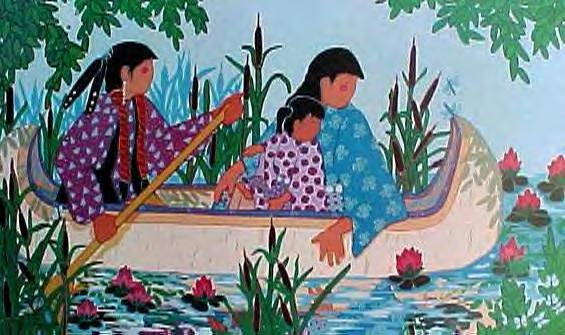|

Peaceful Interludes
"........a viewer approaches a painting. The painting greets the viewer. The space between
the painting and the viewer is where the spirit world lives. That small space separates us."-Virginia Stroud
Over the past thirty years, Virginia Stroud has established
herself as a leading contemporary Native American artist and has compiled an impressive record in the process.
The above quote typlifies her concept of aesthetic values and the objectives she attempts to achieve in her paintings.
Her objectives and methodolgy is further exemplified when she states, "As an artist I touch the human chord
that erases the multicultural boundaries and ask the viewer to look for the familiar and not the differences of
humanity."
Continuing in the earliest traditional painting style,
she does not paint the facial features, and individual identity passes into the background. Characters are ecognized
by their clothing and their identities are established by their roles. This is especially true of the Native American
women who's "roles as caretaker, nurturer, gatherer and spiritual instructor remained the same, handed down
from one generation of daughters to another." Identity is established by what is familiar to a culture, and
the viewer is asked to both recognize the differences through identity and to overlook those differences, thereby
enriching the spiritual world
by minimizing the distance between themselves and the art.
"I paint for my people. Art is a way for our
culture to survive...perhaps the only way. More than anything, I want to become an orator, to share with others
the oldest of Indian traditions. I want people to look back at my work just like today we're looking back at the
ledger drawings and seeing how it was then. I'm working one hundred years in front of those people and saying 'this
is how we still do it...we still have our traditions.'"
Of Cherokee and Creek descent, Virginia was born in
1951 in Madera, California. She was educated in public schools in California and Oklahoma, and graduated from Muskogee
Central High School in 1969. Virginia attended Bacone Junior College from 1969-1970 and the University of Oklahoma,
1971-73, summer 1975, and 1976-77, majoring in elementary education and art.
In May, 1970, she became the youngest Native American
artist to receive first place honors in the Woodlands division of the 25th Annual American Indian Artists Exhibition
at Philbrook Art Center in Tulsa, Oklahoma. In 1972, she won the Heritage Award at the Five Civilized Tribes Museum
in Muskogee, Oklahoma. In 1975, Virginia again won a first place award at the 30th American Indian National Exhibition
at the Philbrook Art Center. In 1982, Virginia Stroud was selected Artist of the Year by the Indian Arts and Crafts
Association..
|